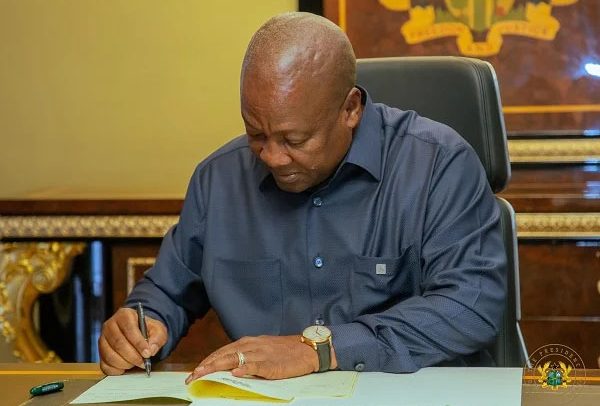President John Mahama
President John Dramani Mahama has officially signed into law a set of bills that abolish the Electronic Transfer Levy (E-Levy), the emissions tax, and withholding taxes on betting, lottery, and unprocessed gold.
The removal of these taxes fulfills a major campaign promise by the National Democratic Congress (NDC) aimed at alleviating the high cost of living and fostering business expansion.
The decision follows Parliament’s repeal of these controversial taxes on March 26, 2025, after the Finance Committee’s review and recommendations in consultation with Finance Minister Dr. Cassiel Ato Baah Forson and other stakeholders.
E-Levy Abolished
The widely unpopular E-Levy, which imposed a 1% tax on mobile money and electronic transactions, has officially been scrapped.
The repeal bill was introduced by Finance Minister Dr. Forson on March 13, 2025, and was thoroughly reviewed by Parliament’s Finance Committee before its passage.
The government argued that the levy discouraged electronic payments and imposed an unnecessary financial burden on citizens. The repeal is expected to encourage digital transactions, enhance financial inclusion, and improve the disposable income of Ghanaians.
Rationale for Tax Repeal
Originally implemented in 2022 to broaden the tax base and boost domestic revenue, the E-Levy faced severe opposition from the public. Many citizens believed it reduced disposable income and hindered digital transactions.
Dr. Forson emphasised that the repeal aligns with broader tax reforms designed to provide relief to Ghanaians. The government expects the removal of the levy to enhance digital financial services and economic participation.
Revenue Implications and Alternative Measures
The repeal of the E-Levy is projected to result in a revenue loss of approximately GH¢1.96 billion for the 2025 fiscal year. However, the Finance Minister assured Parliament that alternative revenue measures had been identified to ensure government programmes remain unaffected.
Betting and Lottery Taxes Removed
Parliament also repealed the 10% withholding tax on winnings from lottery, betting, and other gaming activities. According to the Finance Committee’s report, the tax negatively affected earnings, particularly for individuals relying on gaming for income. The repeal is expected to boost gaming activities and increase disposable income for players.
Emission Tax Scrapped
The Emissions Levy Act, 2023 (Act 1112), which sought to tax carbon dioxide emissions from vehicles, has also been repealed. Due to widespread public opposition, the tax was never implemented, and the government now plans to explore alternative approaches to environmental taxation through stakeholder engagement.
Gold Tax
The withholding tax on unprocessed gold purchases has also been scrapped. The government observed that the tax had contributed to increased gold smuggling, with Ghana reportedly losing up to $10 billion annually in illicit gold exports.
The repeal aims to encourage small-scale miners to sell their gold through accredited state institutions rather than smuggling it abroad.
VAT Exemption on Motor Vehicle Insurance
In addition to these repeals, Parliament has amended the Value Added Tax (VAT) Act, 2013 (Act 870) to remove VAT on motor vehicle insurance.
The Finance Minister explained that VAT on motor vehicle insurance, introduced in 2023, led to increased costs for vehicle owners and transport operators. Private individuals bore the brunt of the tax as they could not recover VAT costs, unlike businesses that could claim deductions. This, in turn, resulted in higher transportation fares, indirectly affecting the prices of goods and services.
Dr. Forson noted that the removal of VAT on motor insurance would ease financial pressure on households and promote fairness in the tax system. By eliminating this tax, the government hopes to lower transportation costs, reducing inflationary pressures on goods and services.
Govt’s Commitment to Economic Stability
Despite concerns over potential revenue shortfalls, Dr. Forson reiterated the government’s commitment to maintaining fiscal stability while fostering economic growth.
He emphasised that the administration would continue implementing policies that enhance economic participation and improve the well-being of all Ghanaians.
The repeal of these taxes marks a significant shift in Ghana’s economic policy, reflecting President Mahama’s drive to make life more affordable for citizens while ensuring a sustainable and prosperous economy.


